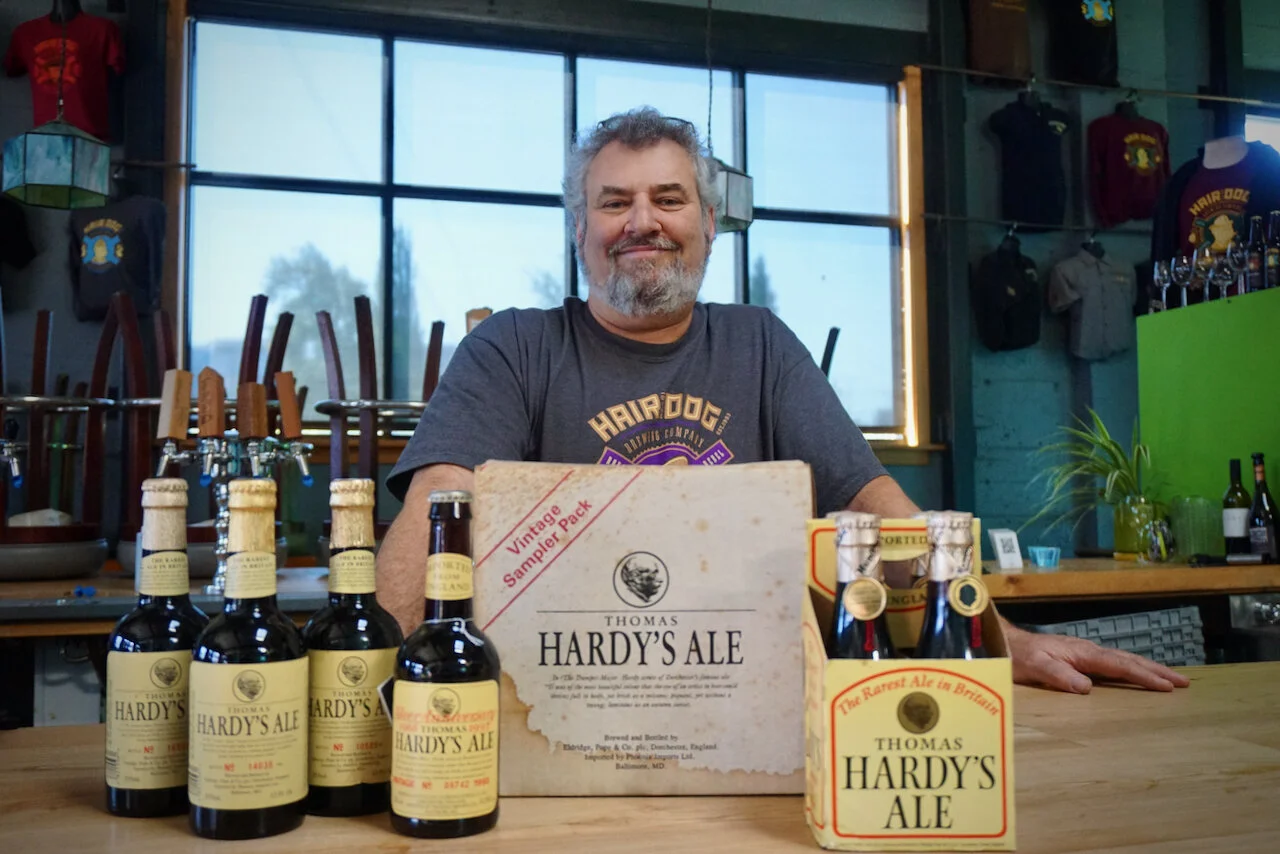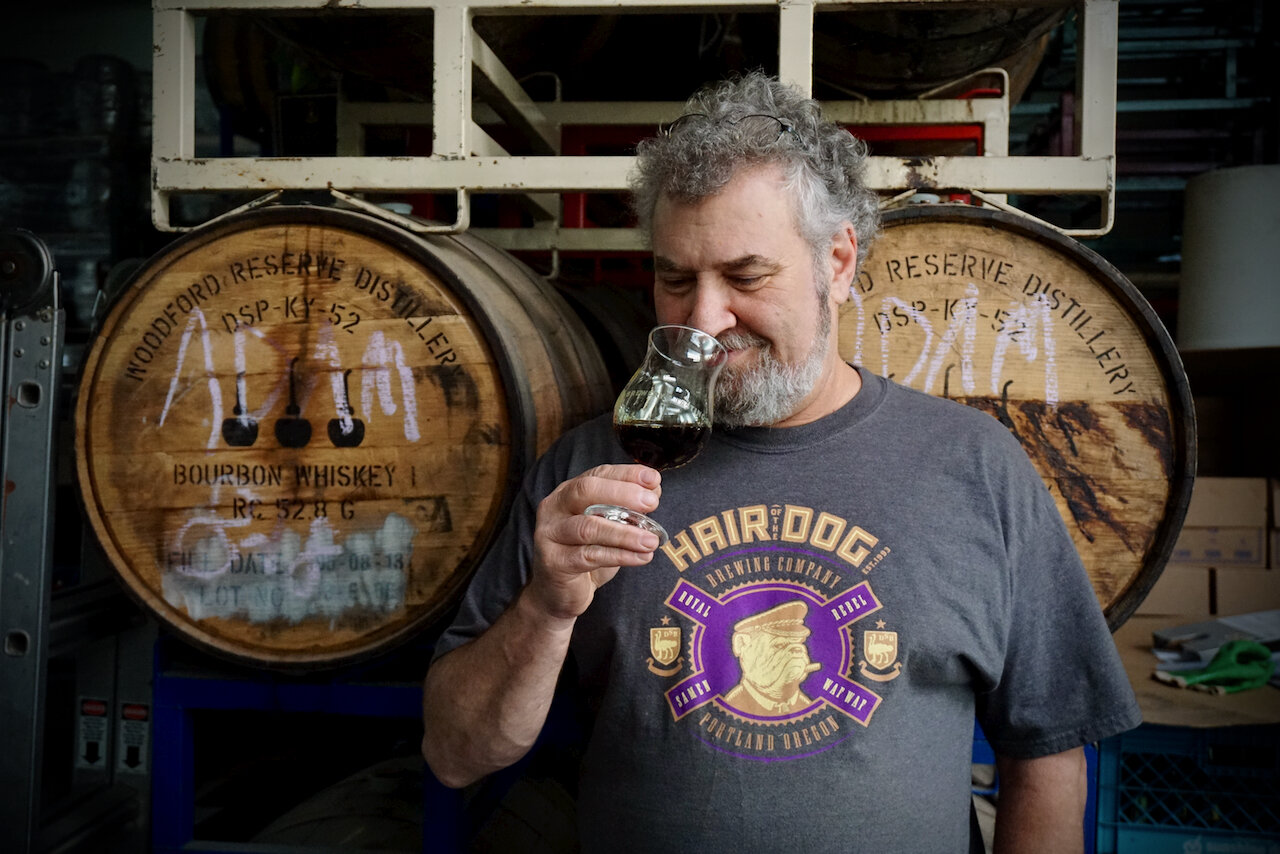The beer that inspired Hair of the Dog Brewing
Alan Sprints was inspired by a classic English-style Barleywine to create his new classic barrel-aged and vintage beers at Hair of the Dog Brewing
Everyone has that one beer – the beer that ignited your love for craft beer and sent you on a journey. This could be a basic lager or something more complex like a gueuze or lambic. In many cases, it’s a flagship from one of the pioneers of the craft beer industry. In our hyper-local craft scene where breweries often crank out several new releases every week, sometimes we overlook the classics and the staples that may have been super exciting at one point in time. These beers may feel antiquated or old man-ish compared to the latest pastry stouts or quadruple dry-hopped haze bomb, but they are still just as worthy of attention. They are also quite often the go-to beers for brewers who want a beer that is balanced, respectable, and not too much of a palate overload. In our column The Beers That Made Us, we talk with brewers about the beers that have made the biggest impact on them in terms of their personal taste and love of craft beer as well as well as how it inspired their approach to brewing.
Few brewers have had such an impact on the modern craft beer scene as Alan Sprints. Founding Hair of the Dog Brewery Company in 1993, Sprints was one of a handful of brewers around the country pushing the boundaries with his array of barrel-aged beers. While his dank IPAs helped Portland and the Pacific Northwest as the land of hoppy beer, Sprints’ barrel-aged offerings earned him a reputation as an innovator and became highly sought after around the world by beer drinkers looking for big bold flavors. Without the beers created by Sprints at Hair of the Dog, one can speculate that this current era of hype beers and the ubiquity of barrel-aged offerings might not be what it is today. After shutting down for over a year during the pandemic and selling some of his rarest offerings online, Sprints has reopened the Hair of the Dog taproom and pub in Southeast Portland where he continues to crank out thoughtfully brewed beers that are simultaneously classic yet new and challenging for adventurous drinkers. Considering his own role and impact as one of the early pioneers of American craft beer, we were excited to go down memory lane with Sprints to learn about one of the beers that had the biggest impact on him that is well worthy of our attention today.
Beer:
Thomas Hardy’s Ale (Barleywine)
Alan Sprints: Although many different beers influenced my thoughts about brewing and my personal style, Eldridge Pope's Thomas Hardy's Barleywine is the one that seems to live in most of what I make today. This beer was originally Brewed in 1968 as a one-off commemorative ale, then again in 1974 and most years after that. The flavor of this beer is a glimpse of brewing’s past, and was quite unusual for me when I first tried it. Thick and malty, the flavor is hot when young but smooths out as it ages. The brand has changed owners and breweries several times, and does not seem to be produced anymore.
Your first time:
Alan Sprints: I started homebrewing in '88 and really enjoyed the research that goes along with understanding beer. There was a store that had a great selection called Burlingame Grocery and as I worked my way through what was available, I found I really enjoyed the flavor of the barleywines, they were complex and full-bodied, something that would improve with age. In those days, there was only a few - Bigfoot from Sierra Nevada, Old Foghorn from Anchor Steam, Rouge's Old Crustation, Bridgeport's Old Knucklehead and Thomas Hardy's. Because Hardy's had been made in England since 1968, it was the benchmark for what an English barleywine should be. The American versions were more hoppy and reflect what my barleywine was to become, but Hardy's planted a seed in my imagination by encouraging drinkers to age it for 25 years. Now, most of my beers will improve with time and I have vintage bottles to show how the changes happen.
What makes it special:
Alan Sprints: Not every beer was imagined by a poet. This beer was brewed to commemorate the 40th anniversary of the passing of British writer Thomas Hardy from this quote taken from his book The Trumpet-Major published in 1880:
“It was of the most beautiful colour that the eye of an artist in beer could desire; full in body, yet brisk as a volcano; piquant, yet without a twang; luminous as an autumn sunset; free from streakiness of taste, but, finally, rather heady.”
The production of the ale was not easy, getting yeast to ferment high strength beers takes skill and brewing a big beer that is balanced takes some faith in your experience. I read stories of the full barrels being rolled around the brewery’s courtyard as a way to rouse the yeast and get this strong ale to ferment as far as possible. As a drinker, I never liked the full feeling you get from drinking lots of beer. High alcohol brewing became my way to explore flavor and enjoy drinking beer in smaller amounts.
Why this beer is influential:
Alan Sprints: If you look at my brewery today, you see a lot of what Thomas Hardy's is. I specialize in unique and special products, vintage dating, wood maturation and beers that improve with time. I am living that quote from 150 years ago and truly always hope to deliver more than expected.
Why beer drinkers should pay attention:
Alan Sprints: Today’s drinkers have more choices than ever before, from the massive number of different brewers, to the endless parade of evolving style choices. Understanding the range of beer flavors is an important skill that everyone should have. I think this beer is a great way to expand your range and understand strong ales a little more, if you can find one.
How this beer inspired your brewery:
Alan Sprints: I think most of my beers would fit right in at a tasting of Thomas Hardy's. This was the first beer I found that encouraged drinkers to age it and I still have bottles I have been aging for 30 years. I always try to absorb inspirations where I find them and create my own thing, so while I have never tried to duplicate Hardy's, you will find strong memories of it in beers like Adam, Matt and Don.
Alan Sprints sips from a 1987 Thomas Hardy’s Ale from his vintage bottle collection




